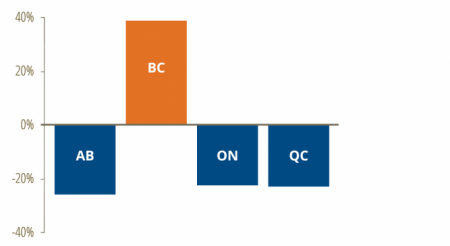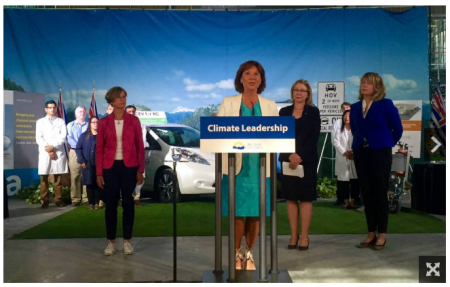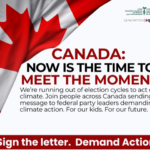August 20, 2016 – The province in Canada that was the leader among equals in the fight to reduce carbon emissions through the introduction of a progressive carbon tax has fallen by the wayside. In a subdued announcement held late on an August Friday afternoon, a day when abnormally hot temperatures in Vancouver rose above 30 Celsius once again, the province’s Premier, Christy Clark, stated that the climate plan going forward will not include a progressive increase in the price of carbon.
British Columbia (BC) was the first Canadian jurisdiction to introduce a carbon tax back in 2008 as part of a concerted effort to reduce greenhouse gas emissions from all sources within the province. The tax when introduced progressively grew in increments to $30 per ton of carbon by 2011. At that time Clark froze the tax and has never continued the strategy of squeezing emissions by taxing them further. The result, what started off as a revenue neutral policy with cuts to personal taxes to offset increases in carbon pricing, has stalled. The net effect, after emissions declined as the carbon price rose, with a freeze in pricing since 2011, they are once more starting to rise while other provinces’ emissions fall.

The likelihood of BC achieving any of its carbon reduction targets is moot. BC had set a goal to cut emissions by one-third of 2007 levels by 2020. Clark used the excuse to not raise the tax by $10 a ton pointing to the lack of similar taxes in other Canadian provinces. She ignored the recommendations made by those in the science community advising her government.
Stated Clark, “I have to balance the need to make sure that our carbon tax remains world leading with the obligation to ensure that family affordability is at the forefront of our minds as well as protecting our economy and job creation.”
The truth, however, doesn’t hold up to that statement since the tax as administered was revenue neutral from the get go. Whenever it rose adjustments were made downward to other provincial taxes. In this way the tax was seen as a model to the rest of the world as the best way to use fiscal policy to tackle climate change.
But political expediency trumps the environment in today’s BC with a provincial election not too far in the future. Stated Joshua McNab, BC’s Director of the Pembina Institute, “BC has the capacity to do much more in the fight against climate change….Not doing so passes the costs of dealing with climate change onto our children and grandchildren.”
Clark’s other excuse for a lack of action pointed to the federal government which has announced its plan to institute a tax on carbon as early as this fall. With a federal price on carbon remaining an unknown, it was easy to defer the decision to increase the provincial tax.
Instead the province announced 21 actions focused on various economic sectors with policy focused on methane reduction, liquefied natural gas, reforestation, an EV program and investment in transportation infrastructure.
Her final shot across the bow to the rest of Canada, “We will consider raising the carbon tax as other provinces catch up.”











